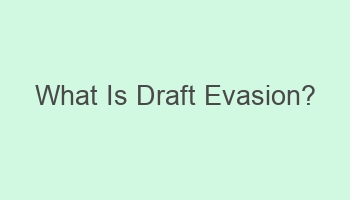What Is Draft Evasion?

Draft evasion refers to the act of avoiding military conscription. It involves individuals intentionally not complying with the draft process. This practice is often done through various means, such as deferment, fleeing to another country, or claiming conscientious objector status. Draft evasion can have serious consequences, including legal penalties and social stigma. It is important to understand the reasons behind draft evasion and the impact it has on both individuals and society. By exploring the motivations behind this act, we can gain insight into the complexities of war and the ethical dilemmas it presents. Stay tuned as we delve deeper into the topic of draft evasion and its implications.
Contents
| Evading draft means avoiding compulsory military service. |
| Conscientious objectors refuse to participate in war. |
| Penalties for draft evasion include fines and imprisonment. |
| Some evade the draft by fleeing to other countries. |
| Medical conditions can be used as a reason for draft evasion. |
- Political beliefs can also lead to draft evasion.
- Students may defer military service through educational programs.
- Some draft evaders seek asylum in foreign countries.
- Legal consequences for draft evasion vary by country.
- During times of war, draft evasion rates may increase.
What Is Draft Evasion?
Draft evasion refers to the act of avoiding conscription into the military during times of war or conflict. It can take various forms, such as fleeing the country, obtaining deferments, or providing false information to evade the draft. Draft evasion is considered illegal in many countries and can result in severe penalties.
- Individuals may choose to evade the draft for various reasons, including moral objections to war, political beliefs, or personal circumstances.
- During the Vietnam War, draft evasion became widespread, with many young men opting to flee to Canada or claim exemptions to avoid military service.
Why Do People Engage in Draft Evasion?
People engage in draft evasion for a variety of reasons, including conscientious objection, fear of combat, or opposition to government policies. Some individuals may also evade the draft due to personal or family circumstances that prevent them from serving in the military.
| Conscientious Objection: | Some individuals refuse to participate in war based on moral or religious beliefs. |
| Fear of Combat: | Many people may seek to avoid military service due to the dangers and trauma associated with combat. |
Is Draft Evasion Illegal?
Draft evasion is typically illegal in countries that enforce conscription laws. Evading the draft can result in legal consequences, such as fines, imprisonment, or other penalties. Individuals who are caught evading the draft may face prosecution by the government.
- In the United States, draft evasion during times of conscription can lead to criminal charges and imprisonment.
- Other countries may have similar laws and penalties for those who evade military service.
What Are the Consequences of Draft Evasion?
The consequences of draft evasion can vary depending on the country and the specific circumstances of the evasion. In many cases, individuals who evade the draft may face legal repercussions, such as fines, imprisonment, or restrictions on future opportunities.
| Fines: | Some countries impose financial penalties on individuals who evade the draft. |
| Imprisonment: | Individuals caught evading the draft may be sentenced to jail time. |
How Can Draft Evasion Be Detected?
Draft evasion can be detected through various means, including background checks, investigations, and reports from the public. Governments may use surveillance, informants, or other methods to identify individuals who are evading military service.
- Authorities may track individuals who have failed to report for military duty or have provided false information to avoid the draft.
- Informants or whistleblowers may report individuals they suspect of draft evasion to the authorities.
Are There Legal Alternatives to Draft Evasion?
Instead of resorting to draft evasion, individuals may explore legal alternatives to military service, such as seeking conscientious objector status, applying for deferments, or serving in non-combat roles. These options allow individuals to fulfill their civic duties without engaging in combat.
| Conscientious Objector Status: | Individuals can apply for conscientious objector status based on their moral or religious beliefs. |
| Deferments: | Some individuals may qualify for deferments based on specific criteria, such as student status or family circumstances. |
How Does Draft Evasion Impact Society?
Draft evasion can have wide-ranging impacts on society, including undermining the fairness of conscription laws, creating social divisions, and influencing public perceptions of war. When individuals evade the draft, it can lead to questions about the legitimacy and effectiveness of mandatory military service.
- Public debates may arise regarding the fairness of conscription and the obligations of citizens to serve in the military.
- Draft evasion can also shape public attitudes toward war, government policies, and national defense.
What Historical Examples of Draft Evasion Exist?
Throughout history, there have been numerous examples of draft evasion during times of war and conflict. From the Vietnam War to World War I, individuals have sought to avoid military conscription through various means, shaping the course of history and influencing public perceptions of war.
| Vietnam War: | During the Vietnam War, many young men evaded the draft by fleeing to Canada or obtaining deferments. |
| World War I: | Conscientious objectors and draft evaders were prevalent during World War I, leading to debates about patriotism and duty. |
How Can Draft Evasion Impact an Individual’s Future?
Engaging in draft evasion can have long-term consequences for individuals, affecting their legal record, employment opportunities, and social standing. Those who evade the draft may face challenges in obtaining certain jobs, securing government benefits, or participating in certain activities.
- Individuals with a history of draft evasion may encounter difficulties in obtaining security clearances or government positions.
- Some employers may hesitate to hire individuals with a record of draft evasion due to concerns about their reliability and trustworthiness.